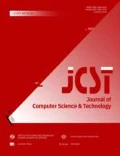Abstract
In this paper, the notion of partial completion of equational theories is proposed, which is a procedure to construct a confluent term rewriting system from an equational theory without requirement of termination condition. A partial completion algorithm is presented with a brief description of its application in a program development system.
Similar content being viewed by others
References
Knuth D E, Bendix P B. Simple word problems in universal algebras. In Computational Problems in Abstract Algebra, Leech J (ed.), Pergamon Press, 1970, pp. 263–297.
Huet G, Oppen D C. Equations and rewrite rules: A survey. InFormal Language Theory: Perspectives and Open Problems, Book R V (ed.), Academic Press, 1980, pp. 349–405.
Huet G. A complete proof of correctness of the Knuth-Bendix completion algorithm.Journal of Computer Science and System, 1981, 23:11–21.
Hullet J. A catalogue of canonical term rewriting systems. Tech. Rep. CSL-113, SRI International, Menlo Park, California, 1980.
Dershowitz N, Jouannaud J-P. Rewrite systems. InHandbook of Theoretical Computer Science B: Formal Methods and Semantics, Leeuwen J Van (ed.), North-Holland, 1990, pp. 243–320.
Guttag J V, Horowitz E, Musser D R. Abstract data types and software validation.Communications of ACM, 1978, 21(12): 1048–1064.
Goguen J, Meseguer J. Equality, type module and generics for logic programming. InLogic Programming Symposium. Sweden, 1984, pp. 22–26.
Peterson G. A technique for establishing completeness results in theorem proving with equality.SIAM J. Comp., 1986, 15:4.
Jouannaud J-P. Church-Rosser computations with equational term rewriting system.LNCS 159, 1988, pp. 85–97.
Peterson G E, Stickel M E. Complete sets of reductions for some equational theories.Journal of ACM, 1981, 28(2): 233–264.
Jouannaud J-P, Kirchner H. Completion of a set of rules modulo a set of equations.SIAM J. Comp., 1986, 15(4): 1155–1194.
Bachmair L, Dershowitz N. Completion for rewriting modulo a congruence.Theoretical Computer Science 69, 1989, pp. 33–52.
Hsiang J. Refutational theorem proving using term-rewriting systems.Artificial Intelligence, 1985, 25: 255–300.
Musser D R. On proving inductive properties of abstract data type. InProceedings of 7th POPL Conference, 1980.
Huet G, Hullot J M. Proofs by induction in equational theories with constructors.Journal of Computer Science and System 25, 1980.
Jounnaud J-P, Kounalis E. Automatic proofs by induction in theories without constructors.Information and Computation, 82, 1989, pp. 42–53.
Huet G. Confluent reductions: Abstract properties and applications to term rewriting systems.Journal of ACM, 1980, 27(4): 797–821.
Klop J W. Combinatory reduction systems [dissertation]. Amsterdam: Math Centrum, 1980.
Toyama Y. On the Church-Rosser property for the direct sum of term rewriting systems.Journal of ACM, 1987, 34(1): 128–143.
Lin Kai, Sun Yongqiang. Semi-regular term rewriting system and its confluence.Journal of Software, 1992, 3(4): 1–11. (in Chinese)
Lin Kai, Sun Yongqiang. Semi-linear term rewriting system and its confluence. InSelected Scientific Papers 2, Shanghai Jiao Tong University, 1991. (in Chinese)
Lin Kai, Sun Yongqiang. The confluence of semi-linear term rewriting systems with local confluence. Technical Report, Shanghai Jiao Tong University, 1992. (in Chinese)
Lin Kai, Sun Yongqiang. Pseudo-linear term rewriting system and its confluence. Technical Report, Shanghai Jiao Tong University, 1993. (in Chinese)
Lin Kai, Sun Yongqiang. Relative pseudo-linear term rewriting system and its confluence. InFundamental Research of Intelligent Computers, Tsinghua University Press, 1994, pp. 474–482. (in Chinese)
Lin Kai, Sun Yongqiang. Compressed path ordering and the structure measure of term rewriting systems.Journal of Software, 1993 4(2). (in Chinese)
Dershowitz N. Termination of rewriting.Journal of Symbolic Computation, 1987, 3(1): 69–116.
Sun Yongqiang, Lin Kai, Shen Li. The design and implementation of a program development system based on rewriting method.ACM SIGPLAN Notices, 1997, 32(2): 27–34.
Author information
Authors and Affiliations
Corresponding author
Additional information
SUN Yongqiang was born in 1931. He is a professor and Ph.D. advisor in the Department of Computer Science and Engineering of Shanghai Jiao Tong University. His interests lie in new type programming languages, theoretical computer science, parallel and distributed systems.
LIN Kai was born in 1962. He received the M.S. degree in 1987, and is now with University of California at San Diego. His interests lie in rewriting theory and techniques.
LU Chaojun was born in 1964. He received the Ph.D. degree in 1995, and now is an associate professor in the Department of Computer Science and Engineering of Shanghai Jiao Tong University. His interests lie in rewriting techniques and database systems.
Rights and permissions
About this article
Cite this article
Sun, Y., Lin, K. & Lu, C. Partial completion of equational theories. J. Comput. Sci. & Technol. 15, 552–559 (2000). https://doi.org/10.1007/BF02948837
Received:
Revised:
Issue Date:
DOI: https://doi.org/10.1007/BF02948837




